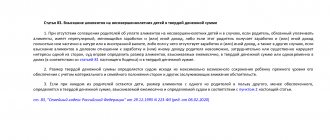Starting from 04/13/2019, by Decree of the Government of the Russian Federation dated 04/01/2019 No. 388, compensation for employee expenses for using a personal car for business purposes is excluded from the list of income from which the employer withholds alimony.
This news gave rise to a conversation about what payments alimony is withheld from, what is the basis for its withholding, and how to correctly fill out a payment order for its payment. Examples from judicial practice are given about payments to which the collection of alimony does not apply. Moreover, fines for violating legislation in this area reach 100 thousand rubles.
Voluntary payment of alimony
The responsibility of parents to support minor children is spelled out in paragraph 1 of Art.
80 IC RF. Child support can be paid voluntarily, both on the basis of an agreement concluded between the parents, and without it. The agreement must be in writing and certified by a notary. In this case, it has the force of a writ of execution. If the established form is not observed, the agreement is considered void.
The agreement can be changed or terminated at any time by mutual agreement of the parties, which must also be notarized. This follows from Art. 100–101 RF IC. If the agreement is presented at the place of work, the employer is obliged to withhold alimony from the salary or other income of the employee paying the alimony and transfer it to the recipient.
Payment of child support can occur voluntarily and in the absence of a notarized agreement on the payment of alimony, but only on the basis of an application from the employee with a request to withhold alimony from him.
Editor's note: at the request of the employee, it is allowed to withhold any amounts without restrictions, but only after withholding personal income tax and amounts under executive documents (letter of Rostrud dated September 26, 2012 No. PG/7156-6-1).
For 2 children
Income tax is calculated from the amount: 36,000 – 1,400 x 2 = 33,200 rubles.
Personal income tax is taken from this amount and amounts to: 33,200 x 13: 100 = 4,316 rubles.
In the first case, excluding tax deductions, the amount of alimony was 10,440 rubles. In our case, this is: 36,000 – 4316 = 31,684 rubles. A third is taken from this amount. Then the alimony will be:
31,684: 3 = 10,561.3 rub.
The employee will receive: 36,000 – 4316 – 10,561.3 = 21,122.7 rubles.
The difference with and without the deduction is: 21,122.7 – 20,880 = 242.7 rubles.
How much alimony is collected?
If agreement on the payment of alimony is not reached between the parents, alimony is collected by the court.
Their size is determined in paragraph 1 of Art. 81 of the RF IC: for one child - 1/4, for two children - 1/3, for three or more children - 1/2 of the earnings or other income of the parents. The size of these shares may be reduced or increased by the court, taking into account the financial or family situation of the parties and other noteworthy circumstances (clause 2). Collection of alimony for the maintenance of minor children in court can be carried out not only in shares of the earnings of the parent from whom alimony is collected, but also in a fixed sum of money.
According to paragraph 1 of Art. 83 of the RF IC, the court has the right to determine the amount of alimony collected monthly in a fixed sum of money (or simultaneously in shares and a fixed sum of money), if the parent obligated to pay alimony:
- has irregular, fluctuating earnings or other income;
- receives earnings or other income wholly or partially in kind or in foreign currency;
- has no earnings or other income;
- in other cases, when the collection of alimony in proportion to the earnings or other income of the parent is impossible, difficult or significantly violates the interests of one of the parties.
From what income can alimony be deducted?
The full list of income from which alimony is withheld is approved by Decree of the Government of the Russian Federation of July 18, 1996 No. 841. It indicates the following types of income:
- wage;
- vacation pay;
- amounts of financial assistance;
- severance pay;
- all types of pensions (except for survivor's pension);
- scholarships paid to categories of students specified in the list;
- benefits for temporary disability, unemployment - only by court decision and court order for the collection of alimony or a notarized agreement on the payment of alimony;
- income from entrepreneurial activities, determined minus the amounts of expenses incurred related to its implementation;
- income from the rental of property;
- income from equity participation in the organization (dividends);
- from other payments made by the employer in accordance with labor legislation.
According to paragraph 4 of the list, the collection of alimony from wages and other income is carried out after taxes are withheld from these amounts.
Decree of the Government of the Russian Federation of July 18, 1996 No. 841 “On the List of types of wages and other income from which alimony for minor children is withheld”
Editor's note : a parent who pays alimony for the maintenance of his minor children is entitled to a standard child deduction for personal income tax. This is possible due to compliance with the conditions of paragraphs. 4 paragraphs 1 art. 218 of the Tax Code of the Russian Federation: the fact that the child is supported by the parents or the spouse of the parent. Payment of alimony confirms this fact (letters from the Ministry of Finance of the Russian Federation dated November 7, 2018 No. 03-04-05/80099, dated August 10, 2016 No. 03-04-05/46762).
Alimony is withheld from severance pay
The Ministry of Labor of the Russian Federation answered the question about the withholding of alimony from severance pay and average earnings for the period of employment, paid upon dismissal of an employee.
True, the letter is about alimony for the maintenance of parents, not children. The agency indicated that alimony should be withheld from these amounts; this is expressly provided for by law. Specifically, in paragraphs “k” and “e” of the list of types of wages and other income from which alimony for minor children is withheld. Moreover, from these payments, alimony is withheld both for the maintenance of minor children and for the maintenance of parents.
Letter of the Ministry of Labor of the Russian Federation dated September 12, 2017 No. 11-1/OOG-1816
Payment period
Most often, the father begins paying alimony immediately after the divorce. In some cases, the first day of such payments is considered to be the date the woman goes to court to resolve controversial issues regarding alimony.
When can a father stop paying a certain amount of child support? As mentioned above, alimony is a payment that provides financial support for a minor child. That is, as soon as the son or daughter of the alimony provider turns eighteen years old, he has the legal right to stop providing financial assistance to his child. It is noteworthy that if a minor child continues to study (at an institute, school or college), he still loses the right to official support from his father. In such cases, responsible parents continue to help their adult child, realizing that studying also requires large expenses. However, this does not always happen. Sometimes fathers, feeling that they no longer owe their child anything legally, stop providing him with financial assistance.
However, there are some nuances here too. For example, if the son or daughter of the alimony provider is disabled since childhood (no matter what the disease), then the father is obliged to provide him with assistance for the duration of the period regulated by Russian legislation.
From what income can alimony be withheld?
All types of income for which alimony cannot be collected are listed in Art. 101 of the law on enforcement proceedings. Let's name some of them. These are, for example, compensation payments provided for by the Russian labor legislation:
- in connection with a business trip, transfer, employment or assignment to work in another area;
- due to wear and tear of a tool belonging to the employee;
- in connection with the birth of a child, the death of relatives, and the registration of marriage.
In addition, these payments also include benefits from the Federal Social Insurance Fund of the Russian Federation, in addition to sick leave benefits, and various compensation payments from the budget.
Necessary penalties
Sometimes, in case of delay in alimony payments, the recipient may ask for a penalty. To calculate it, you need to multiply the required amount of alimony by 0.5 and by the number of days in debt. The alimony recipient will be required to repay the amount received along with legal costs. However, the court may mitigate or completely cancel the sentence if it is proven that the delay in payments occurred due to the serious illness of the payer, difficult family circumstances, or the bankruptcy of the enterprise where the alimony worker worked.
Alimony established in a fixed amount must be indexed
If alimony is established in a monetary amount, then its size must be periodically indexed.
This helps to protect, on the one hand, alimony payments from inflation, and on the other hand, to avoid repeated appeals to the court to change the amount of alimony. The Ministry of Finance of the Russian Federation reminded of this obligation. Namely, when the cost of living increases, the organization indexes alimony, established in a fixed monetary amount. Indexation is carried out in proportion to the increase in the cost of living for children in the region where the recipient of alimony lives. If there is no regional minimum, alimony is indexed in proportion to the increase in the national subsistence minimum.
Letter of the Ministry of Finance of the Russian Federation dated September 3, 2018 No. 03-05-06-02/62540
Editor's note : indexation of alimony collected in a fixed sum of money is provided only in proportion to the increase in the cost of living, therefore, if the cost of living decreases, indexation is not carried out.
It is the employer who is obliged to index alimony payments established in a fixed amount.
Previously, the obligation to independently index alimony collected from the debtor by court decision in a fixed sum of money was provided only if the writ of execution was brought to the accounting department of the enterprise by the claimant. In all other cases, indexing was the concern of the bailiffs. They had to calculate the amount of indexation, make an appropriate decision and send it to the debtor’s place of work. The accounting department could only accept this resolution for execution. But from November 25, 2017, with the entry into force of amendments to the RF IC introduced by Law No. 321-FZ of November 14, 2017, it became unimportant from whom the employer received the writ of execution with a fixed amount of alimony - from the claimant or from the bailiff service.
Failure to fulfill the obligation to index alimony risks a considerable fine from bailiffs under Part 3 of Art. 17.14 Code of Administrative Offenses of the Russian Federation:
- for an organization - from 50 to 100 thousand rubles;
- for its manager (or individual entrepreneur) - from 15 to 20 thousand rubles.
The amount of deductions from income is limited by law
When withholding alimony, it is necessary to take into account the requirements established by Art.
138 Labor Code of the Russian Federation. Namely, the amount of deductions from wages when collecting alimony for minor children cannot exceed 70 percent. Moreover, this refers to the total amount of all deductions, since in addition to alimony, the employee may have other grounds for collection. Editor's note : Exceeding the maximum amount of deductions from wages is subject to criminal, administrative and disciplinary liability. Criminal liability, according to Art. 145.1, is expressed in the imposition of fines, deprivation of the right to hold certain positions or engage in certain activities, forced labor and imprisonment. Administrative liability for legal entities and individual entrepreneurs provides for fines under Parts 6 and 7 of Art. 5.27, which can reach a maximum amount of up to 100 thousand rubles for legal entities. In addition, a prosecutorial audit and a labor inspectorate audit may be initiated against the employer.
If compensation is established by law, alimony cannot be withheld from it
An employee of the Murmansk sea trade port filed a claim against the employer for the recovery of funds and compensation for moral damage.
In terms of recovery of funds, the court satisfied his demands. The reason for the claim was the illegal deduction of alimony from the amount of compensation for travel expenses to the vacation spot and back. According to the plaintiff, these actions of the employer violate his rights, since the said compensation payment does not relate to the employee’s income and compensation from which alimony can be withheld by force of law.
The port, in turn, decided to file an appeal to overturn the court decision. The appeal upheld the decision. The court justified the illegality of deduction from compensation amounts with the following arguments:
- in accordance with Part 4 of Art. 138 of the Labor Code of the Russian Federation, deductions are not allowed from payments that are not subject to foreclosure in accordance with federal law;
- the list of income from which alimony is withheld for minor children is determined by the Government of the Russian Federation;
- despite the fact that this compensation is not named in the specified list, it is indicated in another legislative document - Law of February 19, 1993 No. 4520-1 “On state guarantees and compensation for persons working and living in the regions of the Far North and equivalent areas” . Therefore, compensation is a measure of state support for citizens living in extreme climatic conditions of the north, and not income at all.
Moreover, according to Art. 325 of the Labor Code of the Russian Federation, persons who work in organizations located in the regions of the Far North and equivalent areas have the right to pay once every two years at the expense of the employer the cost of travel and luggage transportation within the territory of Russia to the place of vacation use and back. This right arises for the employee simultaneously with the right to receive annual paid leave for the first year of work in this organization.
Thus, the deduction of child support from the specified payment is illegal and violates the plaintiff’s rights to receive compensation for travel expenses incurred to the place of use of the vacation and back in full.
Appeal ruling of the Murmansk Regional Court dated May 20, 2015 No. 33-1457/2015
Alimony is not deducted from compensation for rental housing expenses.
An employee of a machine-building plant filed a lawsuit against the bailiff to declare his actions illegal, which resulted in the plant’s accounting department being obliged to calculate and withhold alimony from the amounts of compensation payments for renting housing and to determine the amount of arrears he had accumulated in the payment of alimony in the amount of 71 thousand. rubles
The man indicated that housing rental compensation is not his income, so it cannot be taken into account when calculating and withholding alimony.
The citizen was hired from another area, and he did not have living space. According to the regulation on rental compensation approved by the general director, the plant compensated the costs of renting residential premises to employees who do not have permanent housing or permanent registration.
The court of first instance satisfied the citizen's demands. However, the appeal overturned the decision. The cassation returned the case for consideration to the previous instance for the following reasons:
- compensation was established by the labor legislation of the Russian Federation and, in accordance with clause 1 of the list of types of wages and other income from which alimony for minor children is withheld, alimony is not collected from them;
- compensation for the cost of housing is not stimulating in nature and, therefore, does not relate to the income of the debtor from whom alimony is subject to deduction. A non-resident specialist with special experience and qualifications was invited to work, that is, his invitation was made in the interests of the organization, and not in order to increase the motivation and efficiency of the employee’s work function;
- Taking into account the direction of the employer's expenses, the mere circumstance that, as a result of compensation to the employee for his expenses for renting residential premises, his personal needs are satisfied to a certain extent, is not sufficient to conclude that he has income from which alimony is subject to deduction.
Resolution of the Presidium of the Moscow Regional Court of October 18, 2017 No. 546 No. 44GA-279/2017
What is a “clean” and “dirty” salary?
“Net” wages are understood as the actual amount of funds that is credited to the card, account, or issued to the employee after all tax deductions have been made from it. For employees, the tax rate is set at 13%. “Dirty” salary, in turn, is the amount of accrued funds before deduction of all mandatory payments.
IMPORTANT: Do not confuse “dirty” wages with “gray” wages, which are unofficial, since no tax is withheld, so no employer will report it. In connection with this, it is simply impossible to find out its exact size and make a calculation.
Example: Sergeev receives an official salary of 15,000 rubles. This is his “dirty” salary. Additionally, he receives another 15,000 rubles in an envelope every month from his employer. This is a “gray” payment, for which the employer will not withhold alimony.
15,000 – 13% = 13,050 rubles Sergeev will have a “net” salary, from which alimony will be withheld in the amount established in the agreement or awarded by the court.
The Ministry of Labor of the Russian Federation explained how to fill out a payment form for the transfer of alimony
The Ministry has issued detailed instructions for filling out a payment order for alimony payments. The document must reflect:
- number and date;
- amount (in numbers and words);
- details of the organization sending the payment (name, tax identification number, checkpoint, address, bank details);
- details of the payment recipient (full name, address of residence and bank details);
- the purpose of the payment, which indicates the data of the writ of execution or agreement on the payment of alimony (information about the organization that issued the writ of execution, the date of issue, the number of the case or materials on the basis of which the writ of execution was issued, the period for which the money is withheld, and the amount of payment);
- priority and type of payment (according to clause 2 of Article 855 of the Civil Code of the Russian Federation, alimony is a payment of the first priority, therefore in the corresponding field “21” of the order you must enter the number 1).
The agency explained why these details are required to be filled out:
- according to Art. 109 of the RF IC, the organization at the place of work of the alimony payer is obliged to withhold and transfer alimony monthly from his salary or other income. The basis for payment is either a notarized agreement on the payment of alimony, or a writ of execution;
- To pay alimony, three days are given from the date of payment of wages. This requirement is established by Part 3 of Art. 98 of the Law of October 2, 2007 No. 229-FZ and Art. 109 RF IC.
If the address of the recipient of alimony is unknown, it should be transferred to the bank account of a structural unit of the territorial body of the FSSP of the Russian Federation (clause 9 of clause II of Appendix No. 1 to the methodological recommendations on the procedure for fulfilling the requirements of executive documents on the collection of alimony (approved by the FSSP of the Russian Federation on June 19, 2012 No. 01 -16).If
alimony is transferred to an individual’s bank card, then the recipient must clarify the bank details and personal account number.
Unlock access to the private part of Clerk with a Premium subscription. Get hundreds of webinars and online courses, unlimited consultations and other proprietary content for accountants.
Hurry up to subscribe with a 20% discount until October 15, 2021. Read more about “Premium” here.
Useful tips
What part of the salary do bailiffs have the right to withhold?
If life circumstances have developed in such a way that you have become the payer of alimony, then you should follow a few fairly simple recommendations that will allow you to avoid additional difficulties. Among the recommendations that must be followed, the following must be noted:
- When making a payment, be sure to indicate its purpose. It is recommended to note why the money is being sent, as well as the name and date of birth of the child for whom the money is intended. If you do not follow this advice, then you will not be able to prove that you are right in a conflict situation. For example, the recipient may claim that you sent funds for other purposes, but did not pay alimony. In such a situation, you may end up with quite a serious child support debt.
- After completing all transactions, keep your receipts. Even if you used an online service that stores the history of all completed transactions, it is best to print a receipt. This is because if, due to some technical problems, your transaction history disappears, you will still have documentary evidence that you have made your child support payments on time.
- A short period of time after the transaction has been completed, contact the recipient and make sure that the money has arrived. If payment is delayed for too long, you should immediately contact the credit institution.
- There is no need to split your monthly alimony payment into several parts. The entire amount should be transferred in one transaction, as otherwise you may have difficulty proving that child support was paid on time.
Practice shows that the best option for paying alimony is an online service from the credit institution in question. This is because it allows you to use an automatic payment system that will make monthly payments without your participation. This way, you will not forget to pay child support on time.









